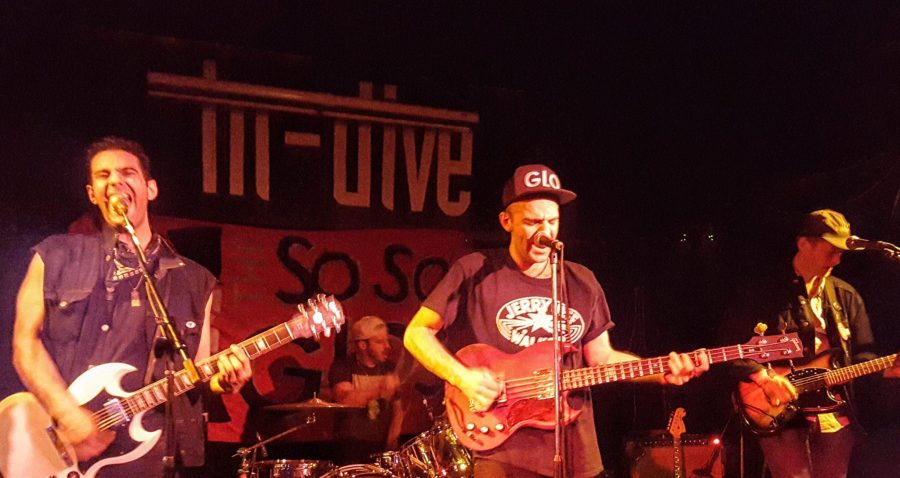When a band is described as punk, you might assume uncoordinated guitar parts, untrained vocals, and power chord melodies. The So So Glos take the early sounds of punk and fuse it with catchy riffs and melodies while keeping the light hearted and energized spirit of the culture. I describe them as classic, energetic punk with a lick of modern sounding flavor. But with that flavor is a message combining these songs with political statements and the current state of our country. With their third studio release, Kamikaze makes the band’s sound explode even louder and prominent than before. The So So Glos were on tour with The Dirty Nil and I got to talk with them about their new record when they stopped by at The Hi-Dive.
How are you guys doing? How has tour been going so far?
Ryan Levine: Pretty good. Tour’s been good, man
You guys played Omaha last night? How was that?
RL: We played at a bar called O’Leaver’s. It was a last minute show that we booked cause we have some friends there. We’re friends with Desaparecidos and they all live there. So the drummer’s other band played. They opened and set up the show last minute for us. And the band Cursive owns that bar. It’s all homies there, so it’s cool. We have a little Omaha family.
You just released Kamikaze last week, what’s the reception been like so far?
RL: I think the fans are digging it. The reviews are good. I think that’s the most important thing. Live, the songs are coming across well.
Alex Levine: It’s good to play new songs. This has been a long time coming, this record. So to get out and play them again, it feels good.
You guys are have huge punk background and include anarchist ideals in a large part of your songs. What are your views and beliefs on anarchy in general?
RL: I wouldn’t say we’re into anarchy.
AL: There are anarchist ideals that are definitely embedded. You can look at a space like Shea Stadium or something like that, in a sense that is what the early, turn of the century, anarchists were talking about. But I don’t know. We’re functioning within the system. You have to build your own kind of utopian thing and you can’t really have a pure sense of anarchy in a total purist way. But it’s evolved, much like in the word punk. You called us a punk band but I think that everything just evolved to meet the times. And more than anarchists I think we have an anti-sexist, anti-racist, anti-homophobic ethos that have embedded into our music and message. That kind of all inclusive and subversive thing. And using the system in which you have to, kind of, poke fun at it because you are a slave to it, but that doesn’t mean you can’t change it. So we have those anarchist ideals and they just keep getting pushed into this mechanism that we have and then it tilts. And it tilts and it tilts. I think we’ve seen that in collective consciousness. Like, Bernie Sanders is not an anarchist but he’s capturing the collective consciousness with more socialist thoughts. As a democratic-socialist as he calls himself. But that’s there and I think we’re moving towards more systems, something like grass root systems or a DIY thing that can exist inside a city of people working together. In times when on the other end of the spectrum you have the Donald Trumps of the world and the major corporations that are at the other end.
Our songs aren’t completely topical songs, either. There’s a lot of subtext in there. There’s pop songs. Then there’s political undertones, for sure. I do think that we do come from that, in the mind. But our only weapon is songs. So we can do that. We can use our subliminal powers of “beaming” our thoughts on a subconscious level through pop melodies. But are we going to change the world? I’d like to think so but everyone should think that. Small changes. If you change your own world, you can maybe inspire someone else to think a different way or start a conversation. A lot of the early anarchists were having conversations like that. If there’s anything that we’re most closely tied to, it’s that never ending conversation on how to make a better system.
Those are some wise words.
AL: That was a long winded answer. (Laughs)
“A.D.D. Life” suggests that we live in a world of overwhelming distractions.
Zach Staggers: I’m sorry, what?
RL: Yeah, I wasn’t paying attention. (Laughs)
“A.D.D Life” suggests that we…
RL: Sorry you’re going to have to start over again (Laughs)
(Laughs) I get it now. Do you think that it’s caused by the ease of access to a vast amount of information that we have with the internet?
RL: I think that helps it.
AL: I think we’re definitely moving more towards that. We used to have fifteen minutes of fame and now we have about fifteen seconds of fame. You have click bait that erases… There’s no news. There’s hardly any music journalism. It’s just a little blurb with a catchy title that you click on and then you go to the next thing. That’s also true of a lot of journalism. The thing about journalism is that it used to be… You had to think about your words that you were going to write because they were going to be printed. But now, when there’s no print, you just have to regurgitate stuff and then just come up with something that people are going to click on. It’s all basically an advertisement that’s just fucking each other. Like one goes to here and one goes to there. They’re all just piggy backing on each other’s clicks. Everyone’s trying to do that. Artists are kind of at the bottom of that. But, in terms of a broader culture? A.D.D. yes. That’s specifically within journalism, but we all get our information like that. And we’re all moving towards this 1984 scary… I guess it’s like an alien that mimics our brain… How our brain works and kind of exploits those…
Matt Elkin: They’re trying as hard as they can to give you what you want in a box. And then figuring out a way to make that box be more of what you want to stare at all the time.
AL: It’s just a different way for people that have always controlled other people to do it. And there is an element of freedom because there’s information. There’s good and bad things about it, of course. I guess we’re focusing on the internet now. We need to remember that we still need to talk about it. That’s what I think.
RL: You still need to sit down and have conversations with your grandpa.
AL: We’re losing certain social skills and certain, really important, human things. It has to do with empathy. And when you can’t look someone in the eye, we’re just losing that, I think. That doesn’t mean that it’s not going to swing back or be a reaction to it, which there already is. Let’s not forget about it.
ZS: It’s the way we’re going.
AL: I do think it’s scary how quickly it’s happened because it feeds that A.D.D.
RL: We’ve accepted it into our lives very quickly.
AL: We accept everything.
RL: Everyone has adapted to it very quickly. The “this” stance (Turns palm face up and looks down at it), you know exactly how that is no matter what.
Even just ten years ago when I was in middle school not that many people had smartphones. No one knew what they could do.
RL: And now you can’t find someone without one.
AL: We live in a new world.
RL: We’re very accepting, very adaptable creatures.
How do you think that you have matured since Blowout going into Kamikaze?
AL: Well I don’t know. Years have passed, you know? So however someone matures in that amount of time. There was a little less of expectations going into this record and a little bit more… I mean, I guess that’s not totally true because on Blowout we didn’t really give a shit either. There was more of not giving a shit. It was like, we didn’t really care about what anyone thought about it. It almost felt like a last record when we were making it. Like, this is our last thing so let’s just do it. That feeling kind of… I think you can feel it. That urgency is a little bit more urgent. The highs are higher, and the lows are lower. I think it goes to darker places. We got a little more pissed off. We’ve been through more stuff. That’s how we’ve mature, just through life experiences.
Does the title of Kamikaze relate to any personal experiences you have had in the last three years?
AL: There’s a lot of ways that it’s kind of intended. One is it’s a suicidal thing coming. Maybe we’re on this self destructive path as a society. Maybe the narrator is taking the wheel and driving, but we’re all about to explode. Or maybe that’s the internal struggle. There’s a lot of talk about mental illness on the record. Feeling like you’re going to blow up, and there’s also the metaphor, “blowing up” big, like Biggie said. And then it’s a comment on extremism, as well. In the modern day. I think the word, “kamikaze” has entered the American lexicon even though if you want to use it in the traditional sense it’s, “A divine wind.” And it changed it in World War II with an airplane flying in, and that has entered. Every since we saw those planes fly into the World Trade Center that’s entered that american lexicon. It’s a comment on that as well. It means a lot of things. It’s, also, kind of like an assault. But our weapon is creativity, our weapon is this music. It’s this burst of energy and positivity. We’re putting a positive spin. It’s redefining it again in that way. I like to play around with words and the meanings of them. I think good words do grow and there’s growth. Maybe we’re taking this somewhere else. Hopefully.


